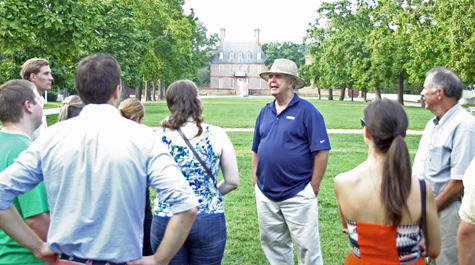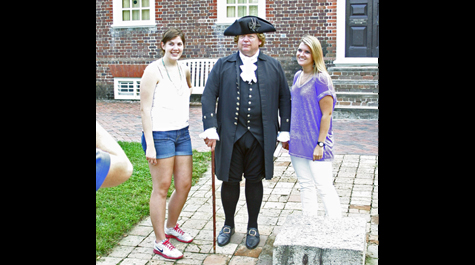On Colonial Williamsburg Tour, New Students Embrace Law School Heritage
As their first week of law school classes came to a close, members of the 1L class and LL.M. students at William & Mary Law School enjoyed a private guided tour of Colonial Williamsburg, followed by a reception with Dean Davison M. Douglas in William & Mary’s historic Sir Christopher Wren Building. The George Wythe Society of Citizen Lawyers sponsored the event.
Students learned how Williamsburg grew as a stronghold along a defensive palisade intended to protect the colonists on the Virginia peninsula. The tour focused on Williamsburg’s importance to the political and civic development of the early United States. Students saw the Governor’s Palace and colonial courthouse. Williamsburg was the capital of Virginia for 80 years until the Revolutionary War, and four out of the first five United States presidents worked here at some point in their careers.
At the George Wythe House, a costumed reenactor related the story of the Law School’s--and the nation’s--first law professor, George Wythe. A signer of the Declaration of Independence, Wythe was mentor to Thomas Jefferson, James Monroe, Henry Clay, John Marshall, and many others who played crucial roles in the early history of America.
The tour concluded on the College’s main campus at the Wren Building, the oldest continually used academic building in the nation. Students learned the building’s history, including its financing with confiscated pirate gold, recovered through the ingenuity of a local minister planning to establish a divinity school.
In the building’s chapel, Dean Douglas talked with students about their experiences in the first week of law school and offered some reflections on the Law School’s ideal of the citizen lawyer. This ideal was the guiding focus for the school’s founding in 1779: to train political leaders concerned for the common good, crucial to the success of the United States’ new government by the people.
Douglas encouraged students to reflect on the idea of the citizen lawyer often during their time at William & Mary, and to remember that “a life well-lived…is a life that goes outside yourself.”
The dean’s remarks were followed by a reception sponsored by the George Wythe Society, a student organization at the Law School dedicated to civic leadership and the ideal of the citizen lawyer.

